OCZ RevoDrive 3 X2 (480GB) Preview: 200K IOPS & 1.5GB/s for $1699?
by Anand Lal Shimpi on June 28, 2011 12:00 PM EST- Posted in
- Storage
- SSDs
- SandForce
- OCZ
- RevoDrive
- SF-2000
- RevoDrive 3
- RevoDrive 3 X2
Random Read/Write Speed
The four corners of SSD performance are as follows: random read, random write, sequential read and sequential write speed. Random accesses are generally small in size, while sequential accesses tend to be larger and thus we have the four Iometer tests we use in all of our reviews.
Our first test writes 4KB in a completely random pattern over an 8GB space of the drive to simulate the sort of random access that you'd see on an OS drive (even this is more stressful than a normal desktop user would see). I perform three concurrent IOs and run the test for 3 minutes. The results reported are in average MB/s over the entire time. We use both standard pseudo randomly generated data for each write as well as fully random data to show you both the maximum and minimum performance offered by SandForce based drives in these tests. The average performance of SF drives will likely be somewhere in between the two values for each drive you see in the graphs. For an understanding of why this matters, read our original SandForce article.
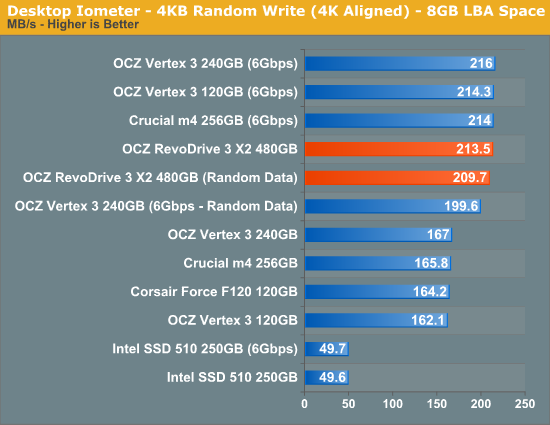
Low queue depth operation isn't going to show any advantage on the RevoDrive 3 X2. This is to be expected. I include these results to point out that for the majority of desktop users, you won't see any benefit from a 4-drive RAID-0 or the RevoDrive 3 X2. I already talked about how most modern SSDs deliver similar real world performance in our last SSD article. The RevoDrive 3 is no exception.
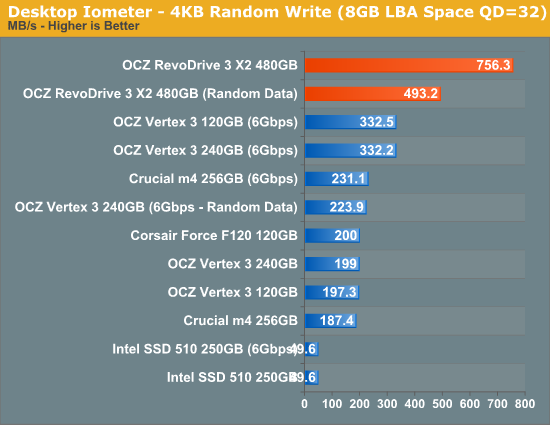
What happens during periods of intense IO activity however? The RevoDrive 3 X2 excels. With incompressible data the RevoDrive 3 X2 is over 2x faster than the 240GB Vertex 3 and with compressible data we're almost at 800MB/s for a single PCIe card.
Note that OCZ's specs for the RevoDrive 3 X2 promise up to 200,000 IOPS, however we're only seeing around 180K IOPS in our QD32 test. What gives? In order to hit those sorts of numbers you actually need to run in a multithreaded/ultra high queue depth configuration (two threads + QD64 in each case). If you actually run in this configuration but hit 100% of the LBA space, a reasonable workload for a high traffic server you'll get numbers similar to ours above (766MB/s vs. 756MB/s). If you limit the workload to an 8GB LBA space however you'll hit the 200K that OCZ advertises:
| OCZ RevoDrive 3 X2 (480GB) 4KB Random Write Performance (IOPS/MBps) | |||||||
| QD=3 | QD=32 | QD=64 | |||||
| IOPS | 52131 IOPS | 184649 IOPS | 202661 IOPS | ||||
| MB/s | 213.5 MB/s | 756.3 MB/s | 830.1 MB/s | ||||
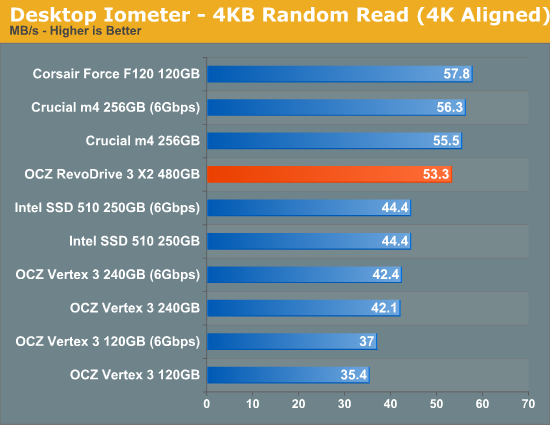
Low queue depth random read performance is nothing to be impressed by.
Sequential Read/Write Speed
To measure sequential performance I ran a 1 minute long 128KB sequential test over the entire span of the drive at a queue depth of 1. The results reported are in average MB/s over the entire test length. These results are going to be the best indicator of large file copy performance.
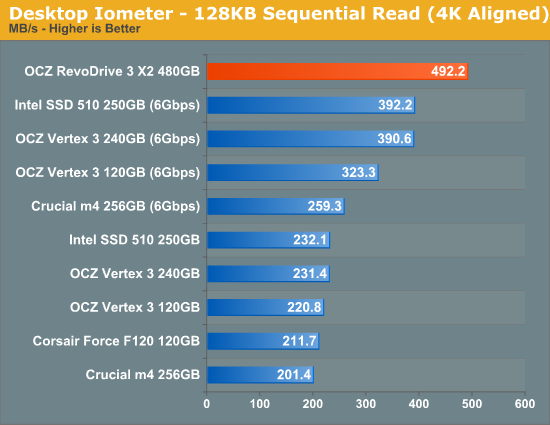
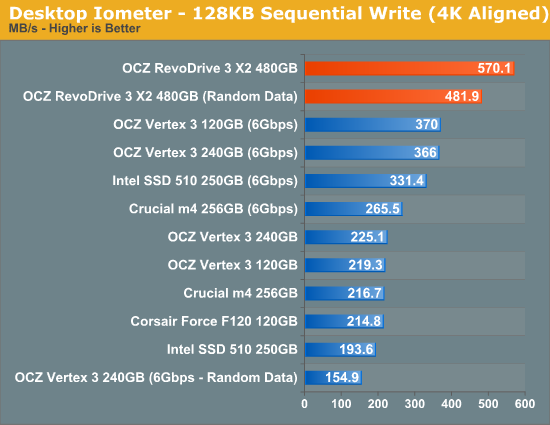
We're still going through the unimpressive tests here - we see some benefit for larger transfer sizes, but the real advantages come when you start loading up the RevoDrive 3...










38 Comments
View All Comments
HMTK - Tuesday, June 28, 2011 - link
Would be nice to see one of these against a Fusion IO drive. Those are enterprise PCIe SSD's but I wonder how they'd compare.You should try to get one for Johan and test it under vSphere.
davegraham - Tuesday, June 28, 2011 - link
a more direct comparison would be with the LSI Warpdrive. TBH, OCZ still isn't ready for prime time in the enterprise regardless of who's ASIC they're using. If they want to play with the big boys, they need a solid support staff and design team in place.one quick quirk with this card is the full height, half-depth design + daughterboard. in a card-dense chassis (esp. 1U systems), this won't fly. An LSI WarpDrive, for contrast, is half-height, half-depth @ 300GB.
dave
skrewler2 - Tuesday, June 28, 2011 - link
I don't know why you think enterprise means they need 'solid support'. This may be true for some organizations, but probably does not apply to the companies that would actually be interested in seeing these benchmarks.HMTK - Tuesday, June 28, 2011 - link
I think as in support for (server) OS's other than Windows. These things could be nice for desktop virtualization. There you typically don't need lots of disk space but you need massive IO when people start working and stuff. Bootstorms kill VDI.davegraham - Tuesday, June 28, 2011 - link
This card wouldn't do a bad job at bootstorms for VDI use cases but the WarpDrive's forte is going to show up there pretty strongly. ;)davegraham - Tuesday, June 28, 2011 - link
OCZ is deciding to move upmarket and not just focus on consumers and SMB anymore. when that move occurs, they need to have an ecosystem that will support the inclusion of these devices in systems, not just try to price themselves into systems. OCZ also has a storied history of reliability issues that are going to impact this as well.MrSpadge - Tuesday, June 28, 2011 - link
Storagereview.com has it compared to the LSI Warpdrive.MrS
davegraham - Tuesday, June 28, 2011 - link
interesting review with the knowledge that most of the workloads i've used the warpdrive for are shown to be it's forte...and it's still a generation behind in ASICs (SF-1200 vs SF-2xxx). I know there'll be a refresh of that part. ;)parsec21 - Tuesday, June 28, 2011 - link
Storage Review just did a side by side review of the Revo and Warp cards although they are intended for different markets. For a fraction of the price the OCZ Revo outclassed or matched the LSI Warp in most real world benchmarks. The only areas where the Warp led were due to it having HW RAID with six SF1200 processors tied to SLC memory along with a $8000-$10000 price tag.
The results show that the design team at OCZ utlizing a custom virtual controller and async MLC memory created a product that offers a great deal of performance for a pretty good price.
storagereview.com/ocz_revodrive_3_x2_480gb_review
skrewler2 - Tuesday, June 28, 2011 - link
I was about to include that in my post but saw you beat me to it. Would definitely be interested in that as well.